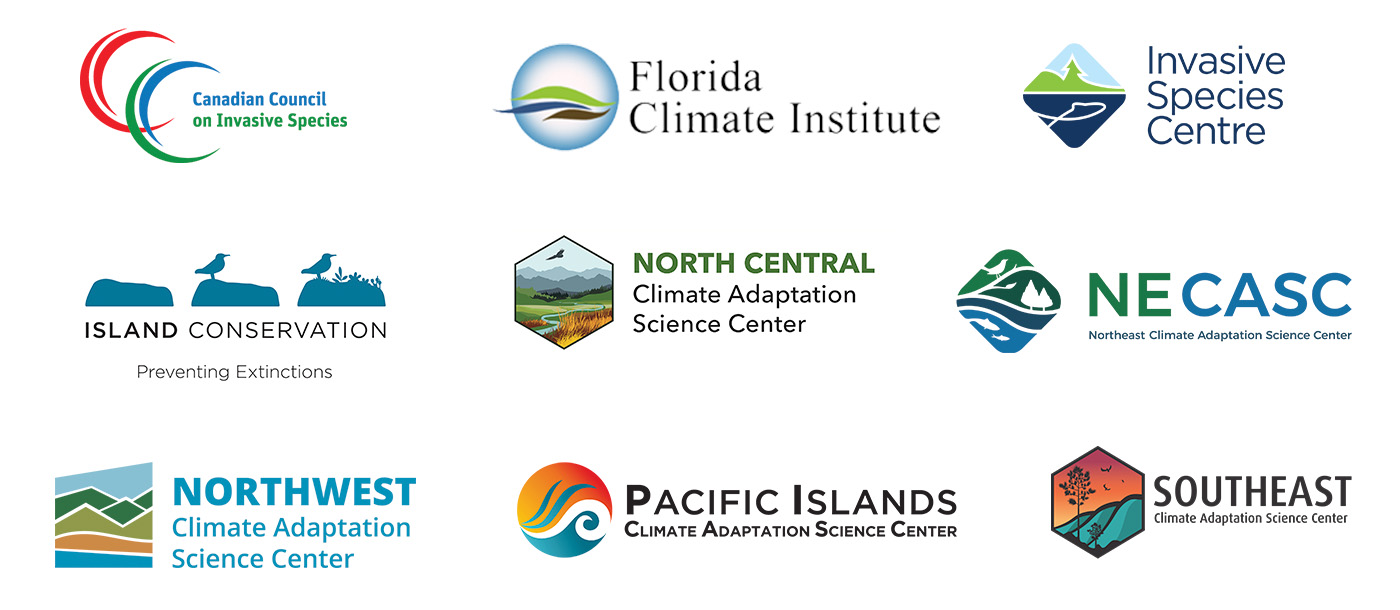

Please join us for the INAUGURAL International Invasive Species and Climate Change Conference (IISCCC) organized by the Regional Invasive Species and Climate Change (RISCC) Management Network on January 30 and 31, 2024. This conference is VIRTUAL allowing for more international attendance while reducing our carbon footprint.
Registration: FREE
Conference registration is free and features topics including sessions on:
Because biological invasions and climate change are global issues that know no boundaries, the IISCCC strives to create space to share research and management practices, expand networks, and promote translational experiences.
Keynote Speaker: Jennifer Grenz
Taking Teachings from our Targets: how storytelling will help shape invasion biology in a changing climate
Jennifer Grenz is an Assistant Professor in the Department of Forest Resources Management at the University of British Columbia. She has a BSc in Agroecology and a PhD in Integrated Studies in Land and Food Systems (both from UBC). Jennifer’s research focuses on applying an Indigenous worldview (she is Nlaka’pamux of mixed ancestry) to invasion biology and ecology and challenges us to think differently about our role in ecosystems management as we face a rapidly changing climate. She is passionate about bridging the practitioner-researcher divide as she worked for nearly two decades providing consulting services and on-the-ground management of invasive species for all levels of government prior to her academic appointment. Her lab, The Indigenous Ecology Lab, is currently working on understanding the impacts of invasive plants on soil microbial ecology and the role of these impacts on post eradication restoration activities.

Plenary Speaker Day 1: Jessica Hellmann
Climate change adaptation meets the notion of native and invasive species
Dr. Jessica Hellmann is Director and Ecolab Chair at the Institute on the Environment and Distinguished McKnight University Professor of ecology at the University of Minnesota. She studies the impacts of climate change on natural systems and methods for adapting to climate change. She leads the Midwest Climate Adaptation Science Center for the US Geological Survey, and in 2018, she co-founded Geofinancial Analytics, a private venture that benchmarks methane emissions in the oil and gas sector. She serves several non-profits as a board member, including the Science Museum of Minnesota, COMPASS (an NGO advancing societal engagement of scientists) and the National Audubon Society.

Plenary Speaker Day 2: Helen Roy and Peter Stoett
Insights from the Intergovernmental Science-Policy Platform on Biodiversity and Ecosystem Services Assessment on Invasive Alien Species and their control
Helen is an Ecologist at the United Kingdom Centre for Ecology and Hydrology (UKCEH) and Professor in Ecology at the University of Exeter. Helen co-leads a large research group within the Biodiversity Science Area. Within the Biological Records Centre (part of UKCEH), Helen leads programs to develop zoological monitoring and research working in collaboration with the volunteer wildlife recording community. She is leading global collaborations to deliver high impact research to understand and predict the effects of biological invasions (and other drivers of global environmental change) on biodiversity and ecosystem function using large-scale and long-term species distribution and abundance datasets.
Since 2008 Helen has led a Defra-funded project to compile information on invasive non-native species for Britain and is currently leading a Darwin Plus project to compile information on invasive non-native species for all the UK Overseas Territories. Prevention, early detection and rapid response are critical to the management of invasive non-native species and the collaborative approaches Helen has developed for horizon scanning to inform prevention have achieved international recognition and application. Her research on biological invasions has gained her international recognition both through informing policy and advancing science including as co-chair of the IPBES Thematic Assessment on Invasive Alien Species and their Control.
Dr. Peter Stoett’s main areas of research expertise include international relations and law, global environmental politics, and human rights; he is especially interested in critical perspectives on the many nuanced intersections between these themes. Current research focuses on biodiversity conservation policy, transnational environmental crime, marine pollution prevention, climate justice, and Canadian-American environmental relations. He has also worked extensively on genocide and war crimes prevention and punishment.
Prior to joining Ontario Tech University, Dr. Stoett was Director of the Loyola Sustainability Research Centre, and Chair of the Department of Political Science, at Concordia University in Montreal, Québec. Currently, he is co-chairing the first global assessment on invasive alien species conducted by the Intergovernmental Science-Policy Platform on Biodiversity and Ecosystem Services (IPBES). He has also worked with the United Nations Environmental Program (UNEP) as a Coordinating Lead Author on the sixth flagship Global Environmental Outlook report, and was a contributing expert on the 2020 IPBES Workshop Report on Biodiversity and Pandemics.



